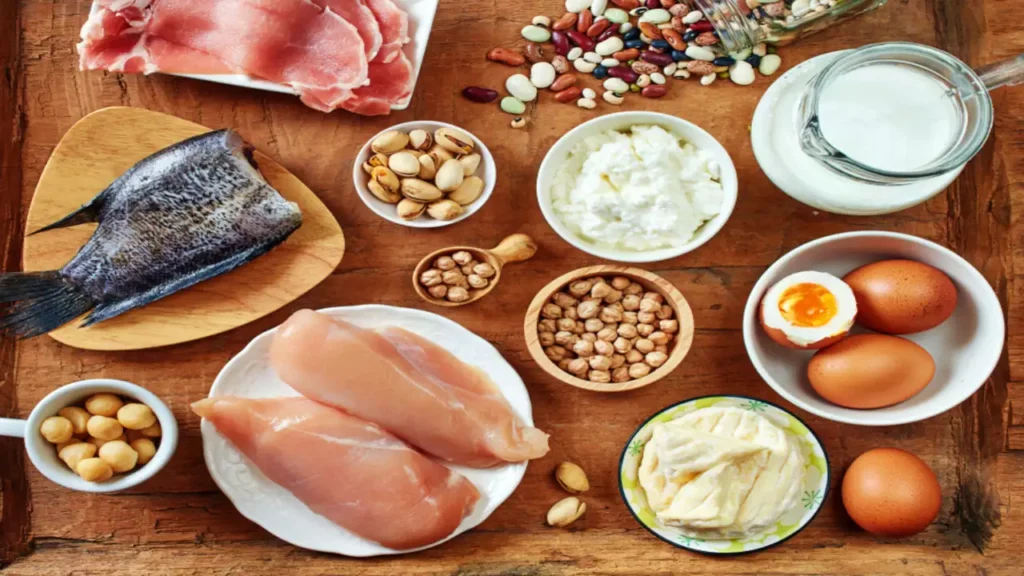Protein is a crucial macro-nutrient that is essential for a healthy and strong body. While everyone is aware of the sources of protein, they don’t know if it’s the right source!

Being one of the essential nutrients other carbohydrates and fat, protein is a mandatory element in daily food palette. Without it, the human body can easily get into a sorry state. When it comes to protein, there is no trouble of meeting the daily needs. There are plenty of sources of protein and most people are aware of these common sources such as meat, egg, milk, and many others.
According to a survey, an adult in the USA consumes more than 90 grams of protein on a daily basis. However, the U.S. Food and Drug Administration (FDA) claimed that the Daily Value of protein consumption should be a minimum of 50 grams. The minimum intake is set to avoid protein deficiency; it is not set to optimize bodily function. It is crucial to know that all kinds of proteins are not the same and so are their sources. Therefore, some particular kinds or sources of protein intake can also lead to bad heart health. Having too much protein is also bad for gut health and leaves no for veggies which creates a lack of minerals and fiber in the body and the system. It can increase the level of cholesterol in the body
That is why, it is important to follow a well-planned protein diet which helps to maintain good physical health and overall well-being. While there is a rise in lean meals, snacks, and plant-based options; some people claim that traditional sources of protein are still the best ones. Let’s get over this debate and find out the 9 best and worst sources of protein that are consumed by most individuals.
- Greek Yogurt (Best)
Greek Yogurt is a creamier and thicker version of the regular tangy yogurt that is liked by all. Its thickness makes it heavier and more protein-enriched than the regular product. By reducing its water, the condensed yogurt gains double the amount of protein, and consuming it can offer more protein than the same amount of regular yogurt. According to USDA, 100 grams of Greek Yogurt can provide 8.78 grams of protein while regular yogurt provides 3.82 gms.
Greek Yogurt can help to bulk up muscle tissue as well as work like a powerhouse for the body that offers other health benefits. Enriched with calcium vitamin D and many other elements, yogurt plays a vital role in overall health and nerve function, like a connection between the mind and the body. It also helps in improving the immunity system and regulating blood flow in the body. Lauren Hubert, a registered dietitian based in Los Angeles, said, “It’s easy to think you’re buying a yogurt that’s high in protein, but it actually has a ton of sugar.” It is recommended to eat plain Greek or Icelandic-style yogurt along with some fruits or honey which offers a catchy combination of sweet and tangy.
- Plant-Based Yogurt (Worst)
While many people are switching to plant-based protein and other products, it is not necessarily good for health. Alyssa Smolen, MS, RD, said, “Most plant-based yogurts don’t contain a lot of protein” She further added, “If you are looking to have yogurt to fulfill your protein needs, it’s best to stick to dairy yogurt, preferably Greek yogurt.” According to the USDA, coconut yogurt can provide only 0.31 grams of protein for every 100 grams and almond milk yogurt provides only 3.33 grams of protein. Evidently, plant-based dairy products contain less amount of nutrients.
- Eggs (Best)
Eggs are something that everyone likes and you cannot go wrong about eggs. According to lifestyle medicine specialist David Katz, eggs can be considered as the most convenient and versatile source of protein which is pretty solid for daily intake. A large chicken egg can provide around 6 grams of protein which offers a serious punch. Egg protein is also easy to digest and good for health as the amino acids present in the egg can used by the body. Compared to meat, dairy, and plant-based sources of protein; eggs are easily available, affordable, and capable of adding more diversity with plenty of dishes. Eggs are recommended by doctors as well since they can help in weight management, blood pressure regulation, and immunity functions of the body. Other than having 40% protein, eggs can also offer vitamins like A, D, E, K, and B12. There is no doubt that it is the best and easiest source of protein to get.
- Red Meat (Worst)
Red meat contains the highest protein levels of any other food. It offers a whopping 29 grams of protein per 100 grams of lean top sirloin; however, there are some downsides to it. According to Dr. Katz, it is a triple threat as it causes environmental impact, potential for animal cruelty, and offers a wide influence on human health. A greater intake of red meat can also lead to bad heart health and can cause serious medical issues like two types of diabetes, if not addressed at the right time.
- Beans (Best)
For every negative mark beef gets, beans seem to get a good remark. Beans are highly enriched in fiber and protein and also contain a very low amount of saturated fat. It has very little environmental impact compared to other sources of protein. It is affordable and can be consumed regularly at a certain amount. Canned or dry beans are considered as a smart choice for protein as only half a cup of beans (100 grams) can provide up to 90 grams of protein and fiber. It is good for the digestive system and helps your body fulfill its daily protein needs.
- Hot Dogs (Worst)
here is no surprise that hot dogs are very tasty and a go-to snack for most individuals. Processed sausages do not provide any health benefits and can cause medical issues similar to red meat consumption effects. Fast food and processed foods are considered to be the leading cause of colorectal cancer. According to a recent report, eating processed meat and hot dogs can increase the chance of ischemic heart disease by 18 percent. According to USDA, a regular hot dog can provide 6.5 g of saturated fat and 472 mg of sodium which helps to nourish 32% and 20% of your daily need for fat and sodium in the body.
- Wild Salmon (Best)
Salmon does not only look and taste good but also consists of ample nutrients which makes it one of the best sources of protein. It can be consumed in diversified ways since there are many cuisines based on Salmon. Wild Salmons are considered the best as they provide 25.4 grams of protein per 100 grams of consumption according to USDA. On the other hand, the farmed Salmons can only provide 22.1 grams of protein per 100 grams. It is more fatty and consists of less protein. Therefore, wild salmon is the best choice in this case. It is also enriched with omega-3 fats which is great for heart health.
- Hard Salami (Worst)
Much like the sausages, salami also fall under the category of processed and preserved meat. However, it is not a good food source for protein with its high degree of preservation along with a lot of fat and sodium. Hard pork salami can provide a huge amount of 22.6 grams of protein for every 100 grams. However, it also provides 13.4 grams of saturated fat, 2,260 mg of sodium, and 407 calories, according to USDA. Therefore, it can be a risk factor for heart health and it is advised to not use it in daily protein consumption.
- Lentils (Best)
Those who are still looking for a plant-based protein to have their fill can easily eat lentils without any guilt. Lentils provide a powerful combination of protein and high fiber which is good for health and offers some of the tastiest dishes including stews, curries, and daal. According to USDA, 100 grams of cooked lentils can offer 9 grams of protein and 7.9 grams of fiber. Whether the legumes are brown, red, black, green, or yellow; every source of lentil can offer healthy protein and top-notch nutrition.
Concluding Thoughts
Protein is the macro-nutrient that everybody needs not just gym enthusiasts and pro athletes. It is highly important for every human body and to make the best decision for protein intake; you must find the best and healthy sources like mentioned above. The best practice here is to stick to minimally processed foods like lentils, eggs, beans, and wild salmon, etc. Before embarking on your protein diet, make sure to consult with your regular physician.































